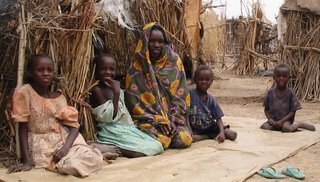 Last Thursday, ER aired “No Place to Hide,” the second of three episodes set in Darfur. “Darfur” (the first of the series) aired March 2, and the last one (“There Are No Angels Here”) airs May 4. These last two episodes appropriately bookend the scheduled April 30 demonstrations in cities across the nation aimed at drawing attention to crisis in that region of Sudan. (For more info on those demonstrations, see SaveDarfur.)
Last Thursday, ER aired “No Place to Hide,” the second of three episodes set in Darfur. “Darfur” (the first of the series) aired March 2, and the last one (“There Are No Angels Here”) airs May 4. These last two episodes appropriately bookend the scheduled April 30 demonstrations in cities across the nation aimed at drawing attention to crisis in that region of Sudan. (For more info on those demonstrations, see SaveDarfur.)What’s the big deal about Darfur? As I’ve outlined before on this blog, millions in Darfur are living in horrible conditions after being driven from their villages, livelihood and homes by the civil war in Sudan - often by the Janjaweed, an Arab militia recruited from local tribes and armed by the government. Many live in squalid conditions in Internal Displaced Person (IDP) camps, and hundreds of thousands are effectively cut off from aid because of the region’s remoteness. Tens of thousands have already died of starvation and disease while those who live in the camps and surrounding areas continue to face killings, torture and rape by government forces and militias.
In addition to the millions in Darfur, over a million people are living in similar camps in northern Uganda and southern Sudan, driven from their homes by the Lord Resistance Army, a band of Ugandan rebels who torture, mutilate and kill villagers and kidnap children to use as soldiers, sex-slaves and laborers. More than 44,000 children—“night commuters”—leave their homes in rural areas every afternoon to walk several miles into neighboring cities where they spend the night on sidewalks in hopes of escaping abduction and abuse by LRA. If they don’t find one of the few refuges set up by religious or relief organizations—which may house thousands of children each per night—they are often abused or raped anyway. (Coincidently, over 50,000 people are taking part in a nationwide demonstration tonight to draw attention to these children and their suffering: the Global Night Commute sponsored by Invisible Children.)
That’s at least three and a half million people—many of whom are children—displaced, abducted, dying and otherwise suffering as a result of civil wars in Sudan and Uganda. That’s a population over three times that of New Orleans before Hurricane Katrina.
“No Place to Hide” did an excellent job not only following up on “Darfur” but also in once again bringing one of the greatest humanitarian crises of our lives into our living rooms. In this episode, Dr. Greogroy Pratt (Mekhi Phifer), a young African-American doctor, joins Dr. Carter (Noah Wyle), who is now volunteering in an IDP camp.
This episode was even better than the last for a couple of reasons. First, it was excellently edited and played out. Kudos to the creative team for going straight through the Darfur scenes without cutting back to Chicago (something that irritated me about "Darfur"). Seeing Darfur through Pratt’s eyes without having to switch story lines was powerful. Also, a great scene between Pratt and Carter as Pratt caught Carter up on the goings on in Chicago. While the counter plot in Chicago (particularly that of a young girl caring for her dementia-bound grandmother) was powerful (suffering—no matter where it occurs in the world—matters), Pratt’s update on the working life of the hospital paled in comparison to the horror of Darfur. I thought it very effective.
Also, this episode effectively allowed the viewer to see through Pratt’s eyes as he entered Darfur, one horrific step at a time. First, we hear about the overwhelming situation in Darfur during Pratt’s conversation with a Sudanese woman on the plane, who introduces him to the crisis. Her final comment—a question, actually—voices over his walk through the hot and unfriendly airport (a far cry from the comfort of his jumbo jet ride). She grimly reflects on how millions are displaced and thousands are dying as the world stands by and debates whether or not it is genocide: “Can you cure paralysis, Dr. Pratt?” she asks.
Then, the situation gets personally overwhelming for Pratt when the jeep he's riding in (on its way to the camp from the airport) gets pulled over by horse-riding Janjaweed and he’s powerless to do anything against their bullying and threats. He walks barefoot through the hot desert (the Janjaweed stripped the jeep and took his shoes), which actually means little to him after he tops a hill and sees the camp stretched out in front of him. One of the final scenes, when Pratt watches a group of men from the camp beat to death a Janjaweed, caps his journey into this horrific world. Each scene takes him one step out of his insulated world and another step into the harsh reality for millions living in Darfur. Very effective and very moving.
I could say lots more about this episode, but this post is already too long. Again, as I’ve said before on this blog, story-telling is a powerful medium, sinking into and lingering in our minds. And that will move to action some of those 10 to 15 million people who watch NBC's ER. What is happening in that small region of Africa is one of the—if not the largest—humanitarian crises of our lives. It is suffering. It is genocide and it is wrong. We cannot stand by and do nothing—especially as Christians. God hates injustice and calls his people to action. The need is great and we must respond. If you need some ideas, look here. Don’t stand by: do something.
(For more background on Darfur, see Wikipedia. Image: Wikipedia) miscctgy